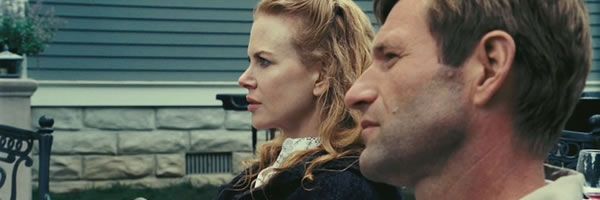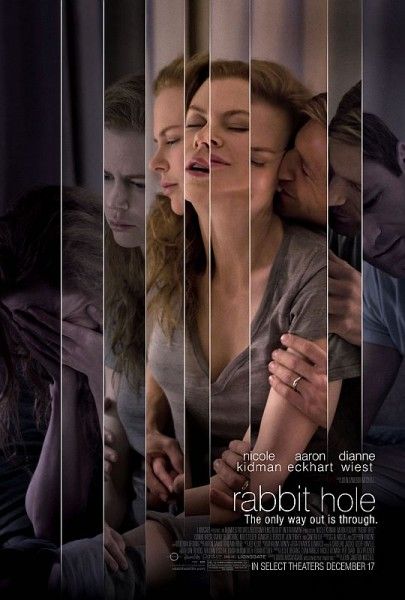Rabbit Hole is simplistic on the outside. But once opened, the honest portrayal of grief can leave one with a myriad of emotions that strengthen the further you get from the film. Recovering from the loss of a child is a process that people deal with in different ways, and that strain can pull the fibers out of a marriage and fray the family around them. Yet, riding performances that examine the depth of real human emotion and dimension, this isn’t the one-trick pony that it could have been. Instead of treating the theme with nothing but morose sadness, director John Cameron Mitchell utilizes levity and threads it throughout with an earnestness that is at once unfamiliar yet comforting. So hit the jump to follow me further down Rabbit Hole.
Becca (Nicole Kidman) and Howie (Aaron Eckhart) lost their son eight months prior, and their relationship is strained as Becca struggles to recover. Becca’s mom, Nat (Dianne Wiest), has a familiarity with the grief, but the two are constantly clashing; they come from different mindsets despite their blood connection. Becca is trying to move forward in her own way; she contains the storm of emotions within herself instead of displaying them to the outside world. To the people around her this seems like she isn’t grieving at all. The world continues to move forward despite the loss, and Howie and Becca’s relationship is pulled in various directions. Will Becca finally find resolution -- if there is such a thing -- or will the grief destroy her bond with her husband irrevocably?
Based on the Tony-nominated Broadway play by David Lindsay-Abaire, who adapted it for the screen, Rabbit Hole explores the typical paths of recovery, but group therapy sessions and talk of a greater purpose from God set Becca on edge. Instead of giving easy answers, the film questions how you can move on without those common mainstays. They aren’t for everyone, and Becca has to forge her own path. However, the film never assaults you with those typical paths of resolution; they are briefly touched on and then the narrative pushes onward. Helping to propel the film forward are the performances from Wiest, Kidman, and Eckhart.
Cinema often shows one side of people, and they are generally painted with broad brushstrokes; good or bad, closed off or open, sympathetic or cold. Yet, the three main characters in Rabbit Hole are shown to have some flaw or blemish that defines them while also having appeal. Howie has a powerful love for his wife, but their struggles emotionally and physically test his loyalty and he shows he has a quick temper. Eckhart has two stunning scenes where he blows his cool and there is an eerie calm after the storm. He is trying to help Becca move forward, but struggles to grasp her method. Meanwhile, Kidman displays inner strength and stubbornness that make her endearing, yet she is prone to displays of physical and verbal aggression. These moments are powerful because they shatter her calm and collected demeanor.
Everyone seems to be walking on eggshells around her, and she constantly has to reassure her friends and family that what they said didn’t offend her -- that she’s fine -- when she is still in turmoil on the inside. Yet, the one person she never reassures is her own mother, who has suffered similar grief. Nat is prone to speaking her mind and when under the influence of alcohol, perhaps oversteps her bounds. There is a very specific difference between their common losses, but Nat has an inspired dialog that puts things in perspective towards the end of the film that leaves a haunting visual.
Meanwhile, humor is intelligently used to both touch and relieve the audience at various points. Laughter can be a coping mechanism, and telling a funny story can give a brief respite from the burden of loss. When Nat tells a light story to Becca, and they both end up laughing about it, you can see how close they can be at times. When Becca and Howie are at group and someone brings up God’s plan, she lets out a brief tirade that leaves audiences snickering at the morose situation. These are the small touches that lend the film earnestness uncommon for such a dramatic theme.
Another small touch that is utilized brilliantly is the music by Anton Sanko and how it can disappear in the middle of intense scenes. A quiet moment in the park is accented by chirping birds and breezes. Additionally, after a few explosive scenes there is a notable lack of score, emphasizing the ups and downs of the journey. All of these tiny details are what round out the experience of Rabbit Hole, and while based on a play, the film never feels like anything less than a well-funded drama.
Each emotional peak in Rabbit Hole is earned and steadily built up, and the performances are rich and multi-dimensioned. While a number of clichés are thrown at the couple, the navigation of those bumps is what keeps the film from feeling on rails. Humor can go a long way to soften blows, but the emotional core is never sacrificed in the search for a laugh. This isn’t an uproarious film by any means, but the short runtime coupled with the interwoven lightness creates a potent dramatic narrative that leaves a lasting impression. Rabbit Hole is currently in limited release and will continually expand in the coming weeks.
Rating: A


